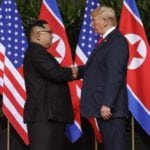 History
History  History
History  Health
Health 10 Everyday Activities That Secretly Alter Consciousness
 History
History Top 10 Historical Disasters Caused by Someone Calling in Sick
 Animals
Animals 10 New Shark Secrets That Recently Dropped
 Movies and TV
Movies and TV 10 Forgotten Realities of Early Live Television Broadcasts
 Technology
Technology 10 Stopgap Technologies That Became Industry Standards
 Weird Stuff
Weird Stuff 10 Wild Facts About Taxidermy That You Probably Didn’t Know
 Travel
Travel 10 Beautiful Travel Destinations (That Will Kill You)
 Miscellaneous
Miscellaneous 10 Modern Marriage Rituals Born from Corporate Branding
 Weird Stuff
Weird Stuff Ten Bizarre Visions of 2026 from Fiction
 History
History 10 “Modern” Problems with Surprising Historical Analogs
 Health
Health 10 Everyday Activities That Secretly Alter Consciousness
 History
History Top 10 Historical Disasters Caused by Someone Calling in Sick
Who's Behind Listverse?

Jamie Frater
Head Editor
Jamie founded Listverse due to an insatiable desire to share fascinating, obscure, and bizarre facts. He has been a guest speaker on numerous national radio and television stations and is a five time published author.
More About Us Animals
Animals 10 New Shark Secrets That Recently Dropped
 Movies and TV
Movies and TV 10 Forgotten Realities of Early Live Television Broadcasts
 Technology
Technology 10 Stopgap Technologies That Became Industry Standards
 Weird Stuff
Weird Stuff 10 Wild Facts About Taxidermy That You Probably Didn’t Know
 Travel
Travel 10 Beautiful Travel Destinations (That Will Kill You)
 Miscellaneous
Miscellaneous 10 Modern Marriage Rituals Born from Corporate Branding
 Weird Stuff
Weird Stuff Ten Bizarre Visions of 2026 from Fiction
Top 10 Mind-Blowing Things That Happened In 2017
Keeping up with the news is hard, so hard, in fact, that we’ve spent the last year rounding it up for you in bite-size weekly chunks. And what a year 2017 was. President Trump had an explosive first 12 months. The lines of geopolitical power were redrawn in the Middle East. There were nuclear crises, major scientific breakthroughs, deadly attacks, and even some minor blips of global good news.
Picking a Top 10 from the hundreds of stories this column filed in the last 12 months was always going to be a Herculean task. Inevitably, some major stories got left out. (Honorable mentions include the tragic Rohingya Crisis, Catalan’s big independence push, and the awful Grenfell Tower fire.) For what it’s worth, here are the ten stories this column considers the biggest of 2017. If you’ve been ignoring the news all year, here’s what’s been happening.
10 President Trump And Robert Mueller Embarked On An Epic Cat And Mouse Game
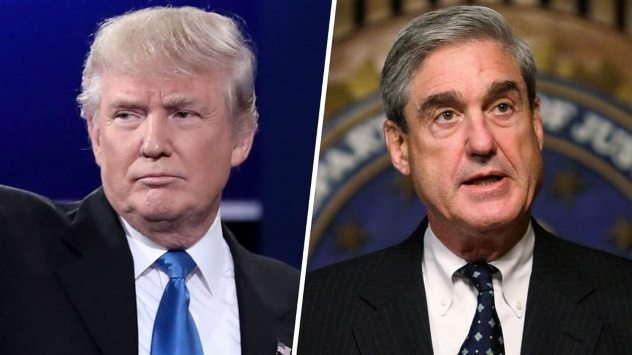
It sounds like a Hollywood thriller. A new president is suspected by the FBI of being in the pocket of the Russians. The White House, in turn, suspects the FBI of working for the opposition party. In a world of rumors, counter-rumors, and sleaze, one man is sent to locate the truth. But what will Robert Mueller do when he finds it?
Yep, it’s the Washington story of the year, the endless cat and mouse game played between the Trump administration and Mueller’s investigation.[1] Set up in May in the wake of the president’s firing of former FBI director James Comey, the investigation was intended to see if there was any collusion between White House figures and the Kremlin.
While the investigation is ongoing, its revelations have rarely left the headlines. Among the biggest were Michael Flynn allegedly trying to orchestrate a kidnapping for the Turkish government on American soil and former Trump advisor Paul Manafort getting busted for money laundering (a crime unconnected to his time on the Trump campaign).
This story will undoubtedly continue to make big waves in 2018. If Mueller actually finds anything, expect it to feature in next year’s roundup.
9 Sexual Harassment Allegations Swept The Globe
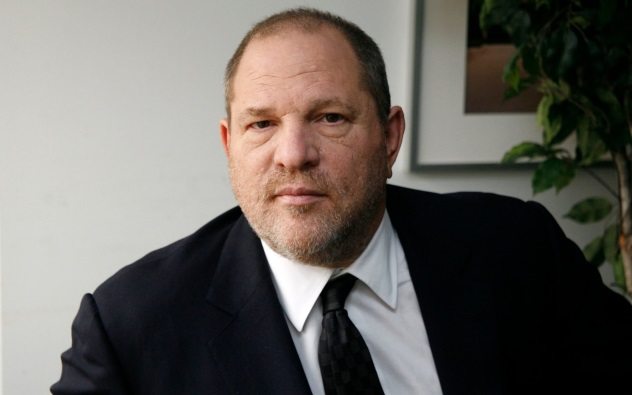
It started with one man.
In October, movie mogul Harvey Weinstein was accused of preying on dozens of women. The tales were horrific, but it was what came next that made this story so important.
Although Weinstein denied the accusations, more people started coming forward with tales of abuse at the hands of powerful men. Kevin Spacey was felled by stories of harassing teenage boys and Louis C.K. by tales that he exposed himself to female fans. Politicians like Al Franken and John Conyers were forced to stand down, and Roy Moore lost Alabama’s special Senate election partly due to harassment claims.
The #MeToo movement soon went beyond American shores. British politicians were brought down. Bollywood was rocked by assault revelations. Sweden’s music industry, Iceland’s media, and the Philippines’ artistic establishment were all hit. Still, the tsunami kept rolling.
The story has not been without controversy. There was a sickening sense of trial by media in some cases, and two politicians (one American, one Welsh) sadly committed suicide when investigations into accusations against them were botched. But there’s no doubt that something changed forever in public life this year. And it all started with Mr. Weinstein.[2]
8 China Flexed Its Muscles On The World Stage

Looking at China in the early 21st century can feel like looking at the US in the early 20th. The Middle Kingdom is transitioning from regional power to global superpower. While most of us were following other stories in 2017, those keeping an eye on Beijing saw the subtle signs of the 21st century’s major power finally emerging.[3]
First, technology. China shoveled crazy money into new tech. This year saw Beijing committing to put a man on the Moon, to becoming the first country to land a probe on the dark side of the Moon, and to dedicate a radio telescope to finding traces of alien life before SETI. More prosaically, Beijing opened a “new Silk Road” railway connecting China to London, made quantum computing breakthroughs, and invested heavily in research and development.
In the murky realm of geopolitics, too, China was making major waves. The Zimbabwean coup happened with China’s blessing. China invested billions buying influence in Africa while also strengthening their hold on the South China Sea. They even threatened India’s borders (a terrifying thought given that the Sino-Indian War claimed thousands of lives). Whether we like it or not, 2017 confirmed Xi’s China is on the rise.
7 Vehicle Attacks Became The New Normal

Barcelona. New York City. Edmonton. London Bridge. Westminster Bridge. Charlottesville. Finsbury Park. For the first time in the West, vehicle rammings became the weapon of choice for terrorists. Thanks to the grim success of the Nice truck attack in 2016, which killed 86, such attacks are the new normal.[4]
This is both a terrible, and a not-so-terrible, thing. It’s terrible because there’s no way to stop a lone scumbag from deciding to crash his truck into people. It’s not so terrible because the death tolls of these attacks (Nice excluded) are often lower. May’s horrific bomb attack at Manchester Arena killed 22. By contrast, it took the Barcelona, NYC, and Finsbury Park attacks combined to kill that many.
Bomb materials are becoming harder for terrorists to locate. When they do get their hands on them, the bombs are often faulty. Attacks on the London Tube and an NYC bus terminal were foiled this year by faulty explosives. The Barcelona attackers even had their bomb factory explode, killing their ringleader.
Sadly, bombings outside the West got even deadlier. Kabul and Mogadishu were devastated by truck bombs this year, the latter killing more people than three Oklahoma City bombings.
6 Science Had A Crazy Big Year

To read science headlines in 2017 was to enter a brilliant alternate world where the daily misery of politics and conflict was replaced by the never-ending wonder of what humans can achieve.
In the past 12 months, we witnessed two neutron stars colliding for the first time. We welcomed the first interstellar object into our solar system (and then got all excited that it might be alien tech). We created durable synthetic DNA. We built nanomachines that can drill into cells and may one day be used to cure cancer. We saw successful trials of treatments for Huntington’s Disease and Hemophilia A. We started rolling out a malaria vaccine. Not a single one of those sentences is anything but awesome.
Of course, every year brings scientific advances, some of them so complex we laymen don’t have a hope of understanding them. (See the creation of “time crystals,” which one of our writers bravely tried to explain here.) But what may be notable is how hopeful some of these stories were. At a time when the world seemed to be going crazy, hearing the good Earth’s scientists were doing provided some succor for the soul.
5 Gay Marriage Continued To Be Accepted Across The World

Time for some good news nearly all of us can get behind.
As recently as 2000, no country on Earth allowed same-sex couples to get married. (A number allowed civil partnerships.) Fast-forward to today, and the number stands at 26—thanks in part to a year that saw several high-profile countries jumping on the feel-good bandwagon.[5]
The most surprising addition was Taiwan, where the Supreme Court struck down anti–gay marriage laws as unconstitutional. Since the Court gave the Legislative Yuan two years to amend existing laws, gay marriage is not yet legal there, but the Court’s ruling means it is now only a matter of time. When it finally comes in, it will be a first in Asia.
Elsewhere, heavy hitters were lining up with the LGBT equality movement. Germany, the EU’s major economic power, voted to make gay marriage legal in June, while Australia’s citizens voted overwhelmingly in favor in a referendum. Tiny Malta also joined the party, enshrining gay marriage rights in July.
However, it wasn’t all feel-good news. Only months after the Supreme Court of Bermuda made gay marriage legal, its parliament voted to outlaw it once again.
4 Africa Said Goodbye To Long-Serving Dictators
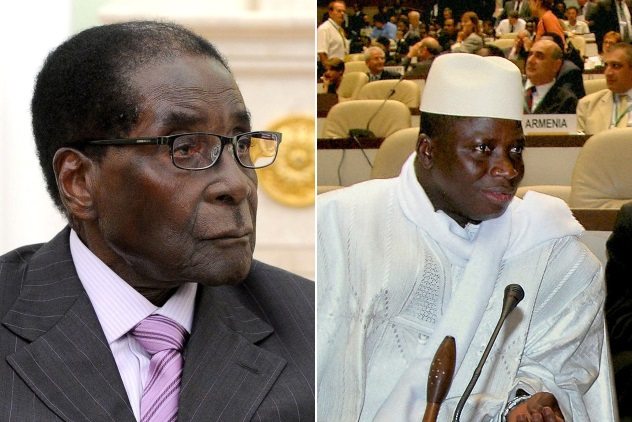
Of all the geopolitical shifts no one saw coming, the biggest this year was surely the fall of Robert Mugabe. After ruling Zimbabwe with an iron fist for 37 years, the African despot was deposed in a military coup. While his successor Emmerson Mnangagwa (a man known as the “crocodile”) isn’t shaping up to be much better, Mugabe’s ousting showed that change is possible even in the most ossified regimes.
In a standard year, the end of Mugabe would be major news by itself. But 2017 was a big one for change on the African continent.[6] Last December, The Gambia’s mad dictator, Yahya Jammeh, lost an election to former store security guard Adama Barrow. He responded by refusing to leave. Then, this January, the unexpected happened. The regional ECOWAS group forced Jammeh to step aside. Barrow became Gambia’s first democratically elected leader in 22 years.
Angola’s transition was less dramatic but no less significant. This summer, elderly autocrat Jose dos Santos stood aside to make way for his handpicked successor, Joao Lourenco. Lourenco then amazed everybody by purging the country’s elite of Dos Santos’s corrupt family and charting a new path. Are we finally witnessing the twilight of the African strongmen?
3 ISIS’s Caliphate Collapsed

In years to come, historians will look back on ISIS as a sickness that gripped the Middle East for a few short years before fading into obscurity. After blowing up out of nowhere to conquer half of Iraq and Syria in 2014, the death cult is now on the ropes. Hammered by US airstrikes and Kurdish and Syrian ground action in 2016, this year saw the caliphate finally crumble away into what it always was: an adolescent dream built of sand.
Over the last 12 months, ISIS’s grip on its territory has slipped, leaving the group with nothing. The first major setback came in July, when the Caliphate relinquished its claim on Mosul—its Iraqi capital—and fled into the desert. More disasters followed. Its Syrian capital of Raqqa fell in October, the same month that it was completely driven from Iraq. In November, its last Syrian town, Albu Kamal, was liberated. ISIS now holds a few villages and some empty tracts of desert. The caliphate is dead.
Now comes the hard part. With ISIS gone, the fault lines in Iraq and Syria are reopening. 2018 could yet see both countries exploding into conflict all over again.[7]
2 The Middle East Reshaped Itself Dramatically
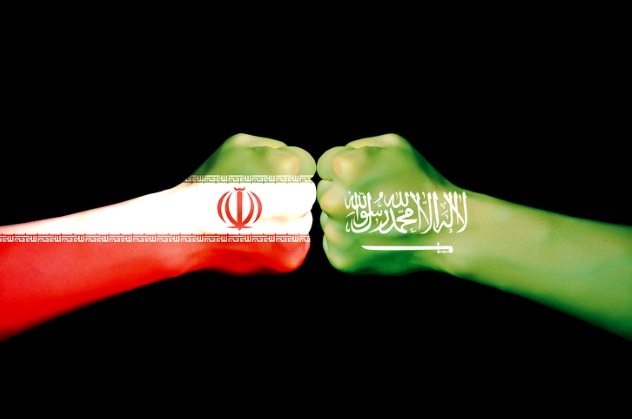
What happens in the Middle East effects the world, so it’s worth keeping an eye on the way power moves over there. And 2017 was a year for power plays.
The biggest move was probably the unstoppable rise of Iran. From an isolated country, Iran has managed to become perhaps the Middle East’s biggest influencer. It was Iranian troops who helped liberate ISIS-held cities. It was Iran—along with Russia—that helped prop Assad up. Iran has helped suck Saudi Arabia into an unwinnable war in Yemen, gained influence in the Lebanese government, and found themselves a seat at the table in Putin’s vision for postwar Syria.[8]
On the other side of the Shia-Sunni divide, Saudi Arabia went all out this year to contain Iran. The Kingdom instituted an economic blockade of Iranian ally Qatar, forced the Lebanese PM to resign (he later backtracked), and stepped up their air war against Iran-backed rebels in Yemen, triggering a catastrophic famine.
The fear is that the cold war between these two rivals may soon become hot. The consequences of such a devastating conflict would be felt everywhere from Washington to Tel Aviv to Moscow.
1 The Crisis On The Korean Peninsula
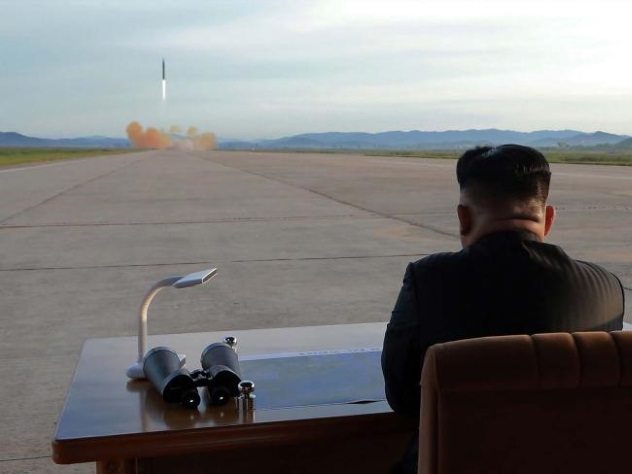
It’s a tiny corner of Asia, a slip of land not much bigger than Idaho. Yet the Korean Peninsula spent 2017 as the most likely place to spark the world’s first nuclear war.
Looking back over our coverage of this year, the Korean story is the one that has kept on rising up, time and again. It began with a North Korean missile test in July that was capable of hitting Alaska. One capable of hitting the US mainland soon followed. Then, in August, Pyongyang threatened to bomb the waters around Guam. They followed up days later with their biggest nuclear test ever. Two months later, they tested a missile that could hit any part of the US.
As this drama unfolded, President Trump engaged Kim Jong Un in a war of words that seemed at times like playing with fire. By the time the year ended, the drumbeat toward war was deafening.
Are we now at the point where war is inevitable? We pray not. A US-DPRK matchup would likely result in South Korea being leveled, Japan being attacked by the dying Kim regime, thousands of US servicemen dying, and a desperate refugee crisis on the Chinese border. It would be a catastrophe that would make Syria’s war look like a minor dustup.[9]
Hopefully, this won’t come to pass. Hopefully, we’ll get through 2018 without our worst nightmares coming true. For now, the world simply holds its breath and hopes.
Catch up on some more mind-blowing recent news events on December 22, 2017 and December 15, 2017.
